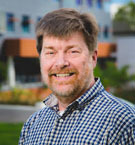This issue’s Last Word comes from The Good Book Blog, the faculty blog of Biola’s Talbot School of Theology. This article is adapted from a post that first appeared on Feb. 1, 2016.
One of the hazards of our age is cynicism. The cynic’s posture is a posture of both suspicion and of nihilism. Cynics tend to assume that other people act for motives about which they are not entirely open, and that if a person’s motives can be revealed, his projects can be discredited. Thus, much of our public conversation takes the form of trying to reveal the underlying motives of those we oppose.
Cynicism also involves a general suspicion of all of our cultural institutions. Whether we are discussing the government, entertainment industry or big business, we assume a critical posture. The very language we use in these discussions is revealing. If we add the prefix “big” or the term “industry” to any institution, we render the institution suspicious. Business may be neutral, but “big business” (as in big-oil or big-tobacco) clearly is not. Health care is a great good, but the “healthcare industry” is part of the problem. Our habit of framing our discussions in such language reveals our deep cultural cynicism.
Cynicism also brings a kind of nihilism with respect to value. We are hesitant to admit that some course of action has value on its own terms. Rather, we tend to exert our energy to undermine or debunk whatever value is being recommended. In public discussions, we see this cynicism with what can be called the “Yes, but ...” response. When someone with whom we disagree raises a good or important point, we rarely stop and think about what she contributed to the discussion. Rather, we tend to respond, “Yes, but ...” We pretend to acknowledge the other person’s contribution but we race over it to get to our other points of disagreement.
Cynicism is corrosive to my eyesight. It makes it difficult for me to see the true, the good and the beautiful when it is right in front of me. It makes it hard to see even the plausible and the promising and the OK-looking. It makes me quick to dismiss and slow to listen. It allows me to react to other voices rather than to hear them.
I want to propose one practice that can help reverse the development of a cynical mind. This is the practice of affirmation. I can summarize it in a sentence: Affirm before you criticize. Make it a habit to search for what is good and true and beautiful about a position or an idea before you look for what is false or bad or repugnant in it. Decide that you will say what is good before you say what is bad. Talk about what contribution a thinker makes before you talk about your criticisms.
Paul lays out the practice of affirmation in his letter to the Philippians: “Finally, brothers, whatever is true, whatever is honorable, whatever is just, whatever is pure, whatever is lovely, whatever is commendable, if there is any excellence, if there is anything worthy of praise, think about these things” (Phil. 4:8).
Paul tells us to think about those things that are commendable, excellent and true. We practice this kind of thinking, first of all, in our relationships with the people with whom we engage. We are to dwell on the honorable, pure, excellent and praiseworthy things about other people, even those who strongly disagree with us. Paul is commending the practice of affirmation. If we approach our conversations with others by searching carefully for those aspects of the work that reflect what is good, true and beautiful, we will affirm before we criticize.
The cynic’s posture can become so comfortable that we forget that it is a particular posture. It becomes like the recliner in my living room. Once I get in it and get settled, it is hard to be motivated to get up. I need a pretty good reason to exert the effort. The seat of scoffers is quite comfortable. If I remember to speak my affirmations out loud, I am prodded to leave my comfortable posture. Practicing affirmation helps me not stay content in the cynic’s seat.
Greg Ganssle, professor of philosophy, joined the faculty of Biola University in 2015. He had previously served as part-time lecturer in the philosophy department at Yale University for nine years, and a senior fellow at the Rivendell Institute at Yale. He holds a Ph.D. from Syracuse University and works in contemporary analytic philosophy of religion.
 Biola University
Biola University
.jpg)

